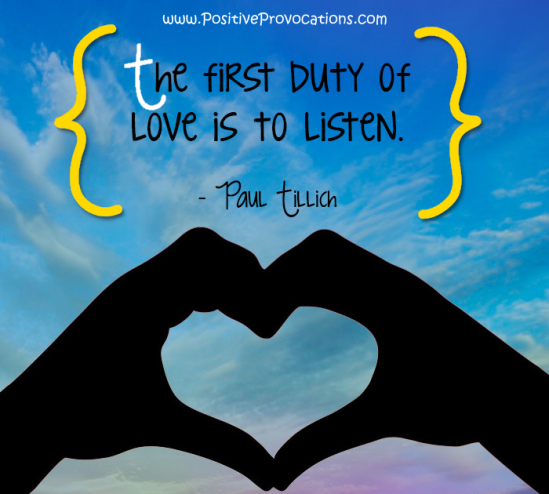
"To speak is a need, to listen is an art."
Goethe
Knowing how to listen is an art, as Goethe said, even more so in a world where many speak and few listen.
The vast majority just listen. That's what we do most of the time: we listen and we don't listen. And what is the difference between hearing and listening?
Although there is no consensus among scholars, regardless of the term used, here we will consider the following definition.
Hearing refers to hearing itself, it is what our ear, our hearing aid, captures. Hearing is receiving sounds, sound stimuli, such as music, a bell or a scream.
Now, listening is something quite different and goes much further. In a nutshell, it would be listening carefully and processing the information internally until full understanding.
In other (and more) words it is listening fully. And this listening fully implies using so many other senses as well. It's putting yourself close to the other, side by side, and opening yourself up to what you receive; empty yourself and receive the other in words.
It involves a donation, because we don't just listen with our ears. There is, in listening, the perception of body language of all codes and signals emitted by the other, which will be decoded by your full listening.
The body speaks, but do you listen to it?
When I worked in a clinic, several times, I heard something that came out of the patients' mouths, their speech, but their body and their body and facial expressions told me otherwise. And, when asked about this divergence, many were surprised by my finding as if, before them, was a seer or a witch who read their thoughts and feelings. But not. It was enough to listen fully to what they were saying with their mouths and what they were saying with the rest of themselves.
We express ourselves not only with words, but also and mainly with our gestures, expression and voice intonation.
Within the business world, the way a person expresses himself or herself can represent whether or not they remain in their job. In human resources, many techniques are used to measure the expression capacity of a competitor for a vacancy. And one who knows how to listen is considered a good professional.
A good leader is a good listener (or “listener” and perhaps “listener”) since, in order to manage people, it is necessary to know how to listen; every good leader knows this.
Listening is a skill we build, it is a healthy and supportive exercise. To learn to listen to others, we must first learn to listen to ourselves. An internal space prepared for this is necessary. By listening to our own self, we open this internal space and will be more available to listen to the other. Listen with empathy.
And why does it seem so difficult? For several reasons:
- Habits that we create to interrupt the speech of the other and to make our own and hasty conclusions about the subject;
To escape reality when the other doesn't say what we want to hear; - Because of the lack of that inner space—I can't hear myself, so I don't have room for the other;
To master dialogue, competitiveness, “I know more than you”;
And finally, studies show that our thoughts work four times faster than spoken words, so it's sometimes difficult to concentrate.
And what benefits does full and supportive listening bring?
A good motivator for learning to listen would be the fact that it is a game changer in a job interview or in your professional career. Knowing what the speaker is really meaning when saying something, his real intentions, can be the differential sought by the company, which can guarantee a vacancy or leverage his career and generate growth within the company.
Within the conviviality with others, you will be able to donate your listening and, forgetting a little about yourself, you will demonstrate the capacity of acceptance, recognition and consideration for the next. And with all of this, you will be achieving great personal growth.
- Listening to each other
- Listen to your inner guide
- Listening to music can transform your energy
By opening these doors, you will have the opportunity to know new ways of communication, you will be close to yourself and the other, obtaining great emotional growth.
Listening is saying how important the other is, it is respecting others and yourself. It is perceiving feelings behind the words and gestures, it is sheltering the other in this internal space and generating new forms of understanding and love. Listening is a beautiful way to show love. Because, at certain times, the only thing the other needs is someone who will listen.
In a world where everyone talks and no one listens, learning to listen is a gesture of generosity, wisdom and humanity.

























